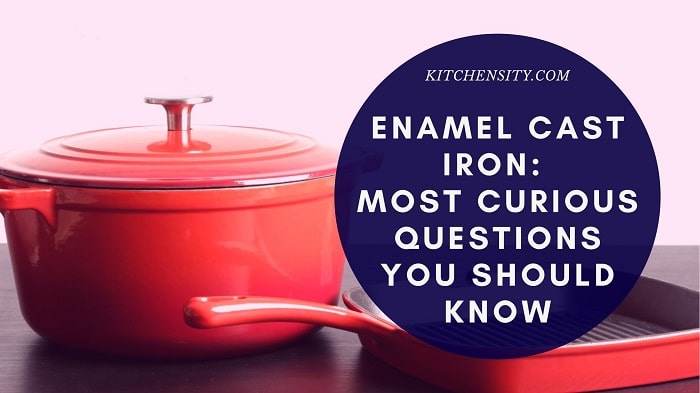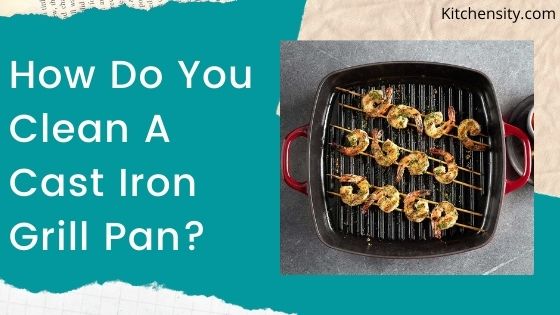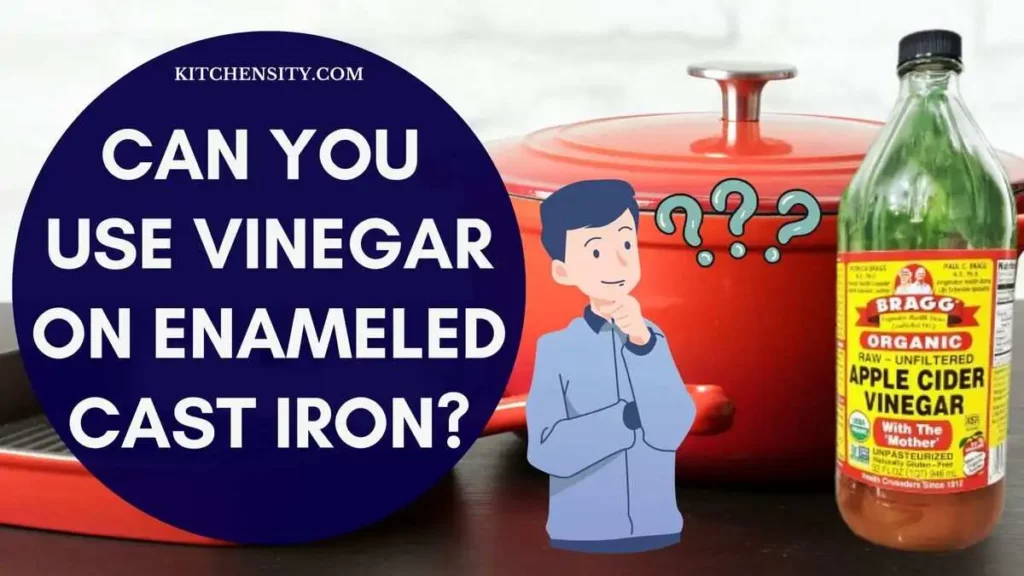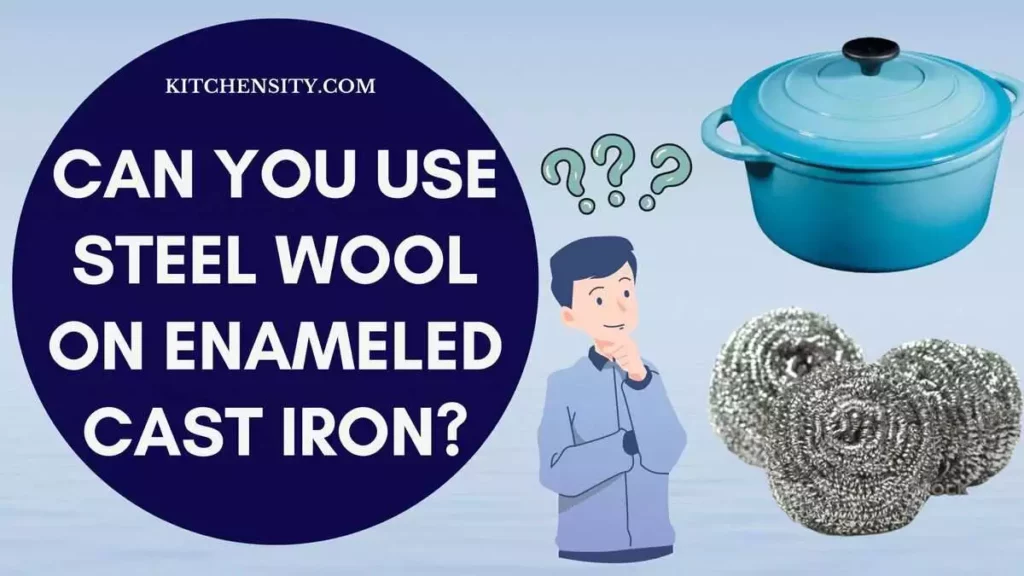When it comes to cooking with cast iron pans, one essential step is seasoning them properly. Seasoning helps create a non-stick surface and prevents rusting.
While there are various methods to season cast iron pans, one common question that arises is whether olive oil can be used for this purpose.
In this article, we will explore the benefits of seasoning cast iron pans, and traditional seasoning methods, and delve into the use of olive oil as an option for seasoning.
So, let’s find out if olive oil is suitable for seasoning cast iron pans.
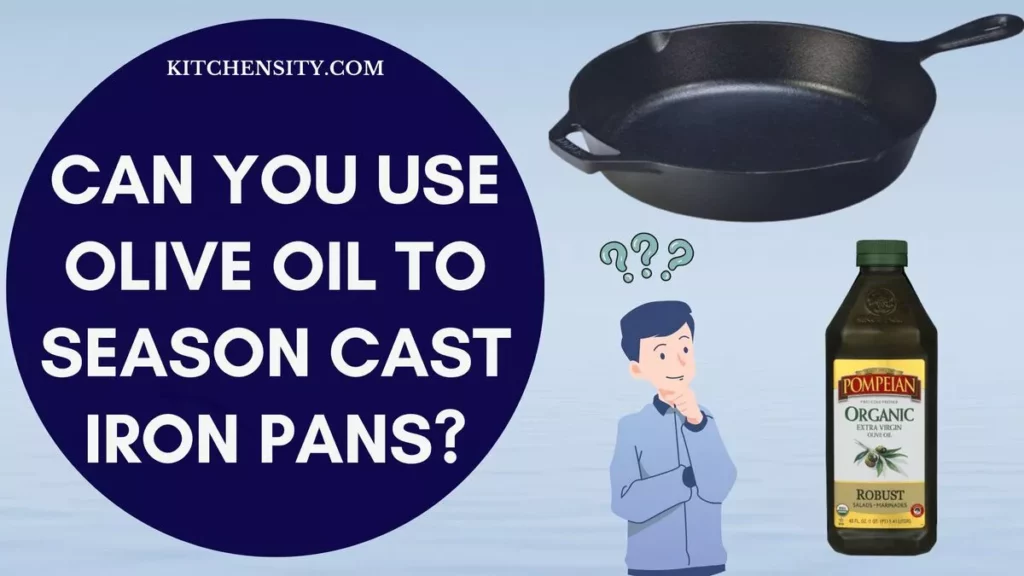
Table of Contents
- 1 Can You Use Olive Oil To Season Cast Iron Pans?
- 2 What Is Seasoning And Why Season Cast Iron Pans?
- 3 What Happens If I Season My Cast Iron With Olive Oil?
- 4 Pros And Cons Of Using Olive Oil For Seasoning
- 5 How To Season Cast Iron Pans With Olive Oil?
- 6 Traditional Methods Of Seasoning Cast Iron Pans
- 7 Does Olive Oil Go Rancid On Cast Iron?
- 8 How To Maintain Seasoned Cast Iron Pans?
- 9 Final Verdict
- 10 YOU MAY ALSO LIKE
- 11 FAQs
- 11.1 Is Olive Oil A Good Option For Seasoning Cast Iron Pans?
- 11.2 What Temp To Season Cast Iron With Olive Oil?
- 11.3 Can I Use Any Type Of Olive Oil?
- 11.4 What Is The Best Oil To Season A Cast Iron Skillet?
- 11.5 How Often Should I Season My Cast Iron Pan With Olive Oil?
- 11.6 Can I Use Olive Oil To Restore A Rusty Cast Iron Pan?
- 11.7 Are There Any Alternatives To Olive Oil For Seasoning Cast Iron Pans?
- 11.8 Will Olive Oil Rust Cast Iron?
Can You Use Olive Oil To Season Cast Iron Pans?
Yes, you can use olive oil to season cast iron pans. Olive oil is a versatile cooking oil that can be used for various culinary purposes, including seasoning cast iron pans. However, it’s important to note that using olive oil for seasoning may not provide the same level of durability as some other oils specifically designed for this purpose.
Also Read – do you need to season enameled cast iron?
What Is Seasoning And Why Season Cast Iron Pans?
Seasoning refers to the process of treating the surface of a cast iron pan with oil and heat to create a natural non-stick coating. This coating helps in cooking and prevents food from sticking to the pan.
Seasoning cast iron pans offers several benefits. It enhances the natural non-stick properties, making it easier to cook and clean. Additionally, seasoning helps in preventing rust and corrosion, prolonging the lifespan of the pan.
Also Read – Can You Use Enameled Cast Iron On A Glass Cooktop?
What Happens If I Season My Cast Iron With Olive Oil?
When you season your cast iron pan with olive oil, several things happen. The oil penetrates the surface of the pan, filling in the tiny pores and creating a smooth, non-stick coating. This coating acts as a barrier between the food and the pan, making it easier to cook and preventing sticking.
The process of seasoning involves heating the pan with the olive oil applied to it. As the pan heats up, the oil undergoes a chemical reaction called polymerization.
This reaction causes the oil molecules to bond together and form a durable layer on the surface of the cast iron. The polymerized oil creates a protective coating that enhances the non-stick properties of the pan.
- By seasoning your cast iron with olive oil, you also help prevent rust and corrosion.
- The oil acts as a barrier against moisture, which can cause the cast iron to rust over time.
- Seasoning the pan with olive oil helps create a protective layer that keeps the pan in good condition.
Additionally, using olive oil for seasoning can add a subtle flavor to your cooking. Olive oil has its distinct taste, and when used for seasoning, it can impart a hint of that flavor to your dishes.
This can be particularly desirable if you enjoy the taste of olive oil in your cooking.
It’s important to note that while olive oil can be used for seasoning, it may not offer the same level of durability as some other oils specifically designed for this purpose.
Other oils like vegetable oil, flaxseed oil, or lard may provide a more robust and long-lasting non-stick coating on the cast iron pan.
Also Read – Can You Put Enamel Cast Iron In The Dishwasher?
Pros And Cons Of Using Olive Oil For Seasoning
Using olive oil for seasoning cast iron pans has its pros and cons. Let’s explore them below:
PROS
- Availability: Olive oil is widely available in most households and grocery stores, making it convenient for seasoning cast iron pans without the need for additional purchases.
- Easy Application: Olive oil is easy to work with and apply to the pan’s surface. You can simply use a paper towel or cloth to spread a thin layer evenly.
- Subtle Flavor: Olive oil has a distinct flavor that can subtly enhance the taste of your cooked food. This can be desirable if you enjoy the flavor of olive oil in your dishes.
- Versatility: Olive oil is not only suitable for seasoning cast iron pans but can also be used for various cooking purposes, making it a versatile option in the kitchen.
CONS
- Durability: While olive oil can create a non-stick coating, it may not offer the same level of durability as some other oils specifically designed for seasoning cast iron pans. The seasoning may wear off more quickly with olive oil, requiring more frequent re-seasoning.
- Lower Smoke Point: Olive oil has a lower smoke point compared to oils like vegetable oil or flaxseed oil. This means that it may start smoking at higher temperatures, leading to potential burnt flavors and smoke in the kitchen.
- Potential Stickiness: Due to the lower durability of olive oil seasoning, it may not provide as effective a non-stick surface as other oils. This can result in food sticking to the pan more easily, especially when cooking at higher temperatures.
- Varied Results: The outcome of using olive oil for seasoning can vary depending on factors like the type and quality of the olive oil used, the specific cooking techniques employed, and the maintenance of the seasoned pan. Achieving consistent results may require more experimentation and careful attention.
It’s important to consider these pros and cons when deciding whether to use olive oil for seasoning your cast iron pans.
While it is a viable option, there are other oils specifically formulated for seasoning that may provide a more durable non-stick coating and better overall performance.
Also Read – Can You Use Vinegar On Enameled Cast Iron?
How To Season Cast Iron Pans With Olive Oil?
Seasoning cast iron pans with olive oil is a straightforward process. Follow the steps below to effectively season your cast iron pan using olive oil:
- Clean The Pan: Start by thoroughly cleaning the cast iron pan. Remove any food residues or rust using hot water and a gentle scrub brush. Avoid using soap as it can strip away the seasoning.
- Dry The Pan: After cleaning, ensure that the pan is completely dry. Use a cloth or paper towel to remove any moisture.
- Preheat The Oven: Preheat your oven to a specific temperature, typically around 350°F (175°C). This temperature allows the olive oil to bond with the cast iron surface effectively.
- Apply The Olive Oil: Take a small amount of olive oil and apply it to the entire surface of the pan, including the interior, exterior, and handle. Use a cloth or paper towel to spread the oil evenly, ensuring complete coverage.
- Remove Excess Oil: After applying the olive oil, use a clean cloth or paper towel to remove any excess oil from the surface of the pan. The layer of oil should be thin and even.
- Place In The Oven: Once the oven is preheated, place the oiled cast iron pan upside down on the middle rack. This allows any excess oil to drip off and prevents pooling.
- Bake The Pan: Bake the pan in the oven for about an hour. This process helps polymerize the olive oil, forming a protective layer on the cast iron surface. Refer to the manufacturer’s instructions or the seasoned cook’s recommendations for the precise baking time.
- Cool And Repeat: After the baking time is complete, turn off the oven and allow the pan to cool inside the oven. Once it has cooled down, inspect the seasoning. If desired, you can repeat the seasoning process by applying another thin layer of olive oil and baking again.
Remember, the more you repeat the seasoning process, the better the non-stick properties of the pan will become. Additional rounds of seasoning can result in a smoother and more durable coating.
By following these steps, you can effectively season your cast iron pan using olive oil. Regular maintenance, proper cleaning, and occasional re-seasoning will help maintain the non-stick surface and prolong the life of your cast iron pan.
Also Read – Can You Use Steel Wool On Enameled Cast Iron?
Traditional Methods Of Seasoning Cast Iron Pans
Traditional methods of seasoning cast iron pans involve using oils with high smoke points and natural fats.
These methods have been passed down through generations and are still widely used today.
Here are three traditional methods of seasoning cast iron pans:
Also Read – Can You Put Enameled Cast Iron In The Oven?
Flaxseed Oil Method
- Clean the pan thoroughly by removing any food residues or rust.
- Preheat your oven to around 400°F (200°C).
- Apply a thin layer of flaxseed oil to the entire surface of the pan, including the handle.
- Place the pan upside down on the oven rack to prevent oil pooling.
- Bake the pan for about an hour.
- Turn off the oven and let the pan cool completely inside the oven.
- Repeat the seasoning process 2-3 times, allowing each layer to dry and cool before applying the next.
Vegetable Shortening Method
- Clean the pan thoroughly and dry it completely.
- Preheat your oven to around 350°F (175°C).
- Apply a thin layer of vegetable shortening (such as Crisco) to the entire pan, including the handle.
- Place the pan upside down on the oven rack to prevent oil pooling.
- Bake the pan for about an hour.
- Turn off the oven and let the pan cool completely inside the oven.
- Repeat the seasoning process 2-3 times, allowing each layer to dry and cool before applying the next.
Also Read – Does Enamel Cast Iron Chip?
Lard Method
- Clean the pan thoroughly and dry it completely.
- Preheat your oven to around 350°F (175°C).
- Heat a small amount of lard in the pan over low heat until it melts.
- Use a paper towel or cloth to spread the melted lard evenly over the entire surface of the pan, including the handle.
- Place the pan upside down on the oven rack to prevent oil pooling.
- Bake the pan for about an hour.
- Turn off the oven and let the pan cool completely inside the oven.
- Repeat the seasoning process 2-3 times, allowing each layer to dry and cool before applying the next.
These traditional seasoning methods help create a natural non-stick coating on the cast iron pan, providing excellent heat retention and even heat distribution.
Remember to maintain your seasoned cast iron pan by avoiding harsh detergents, abrasive scrubbers, and prolonged exposure to water.
Regularly applying a thin layer of oil or fat after each use and proper storage will help preserve the seasoning and extend the lifespan of your cast iron pan.
Also Read – How To Clean A Cast Iron Grill Pan?
Does Olive Oil Go Rancid On Cast Iron?
Olive oil can go rancid over time, but when used for seasoning cast iron pans, it is less likely to go rancid due to the high temperatures involved in the seasoning process. The process of seasoning with olive oil involves polymerization, which creates a protective layer on the cast iron surface.
However, it’s important to note that if olive oil is left on the surface of a cast iron pan for an extended period without regular use or re-seasoning, it may eventually turn rancid.
Rancidity occurs when the oil oxidizes and breaks down, resulting in an unpleasant taste and smell.
To prevent the risk of olive oil going rancid on your cast iron pan, it’s recommended to use and maintain the pan regularly. After each use, clean the pan with mild soap, dry it thoroughly, and apply a thin layer of oil to keep it seasoned and protected.
Regular cooking and exposure to heat will help maintain the integrity of the oil and minimize the chances of it turning rancid.
If you notice any signs of rancidity, such as a strong, off-putting smell or a rancid taste in your food, it’s best to clean the pan thoroughly, re-season it, and use a fresh batch of olive oil or another suitable oil for cooking and seasoning.
So, with proper care and regular use, the risk of olive oil going rancid on a seasoned cast iron pan is relatively low. Regular maintenance and seasoning will help keep your cast iron pan in optimal condition for years to come.
Also Read: How To Season And Clean Cast Iron Cookware?
How To Maintain Seasoned Cast Iron Pans?
Maintaining seasoned cast iron pans is essential for preserving their non-stick properties and preventing rust.
Here are some tips on how to properly maintain your seasoned cast iron pans:
- Cleaning:
- After each use, clean the pan with hot water and a gentle scrub brush or sponge. Avoid using harsh detergents, abrasive cleaners, or steel wool, as they can strip away the seasoning.
- If there are stubborn food residues, you can use a small amount of mild soap and a non-abrasive sponge to gently scrub the pan.
- Rinse the pan thoroughly with hot water and dry it immediately using a cloth or paper towel.
- Do not soak the pan in water for an extended period, as this can lead to rust formation.
- Storing:
- Store your cast iron pan in a dry place to prevent moisture and humidity from causing rust.
- To avoid scratching or damaging the seasoning, you can place a paper towel or cloth between stacked cast iron pans.
- If you prefer to hang your pans, make sure they are completely dry before hanging them to prevent water accumulation.
- Avoiding Acidic And Sticky Foods:
- Acidic foods like tomatoes or citrus can erode the seasoning, so it’s best to avoid prolonged cooking or storage of such foods in cast iron pans.
- Sticky or sugary foods can also damage the seasoning. If you cook something sticky, make sure to clean the pan thoroughly after use and reapply a layer of oil.
- Re-Seasoning:
- Over time, the seasoning on a cast iron pan may wear off or become less effective. If you notice food sticking or the pan becoming less non-stick, it’s time to re-season it.
- Follow the seasoning process by applying a fresh layer of oil and baking the pan in the oven as described in the seasoning methods.
- Repeat the seasoning process a few times to build up a new layer of seasoning.
By following these maintenance tips, you can prolong the life and performance of your seasoned cast iron pans.
Regular cleaning, oiling, and proper storage will keep your pans in excellent condition and ready for many delicious meals.
Also Read – Why Does Food Stick To My Enamel Cast Iron?
Final Verdict
In conclusion, while it is possible to use olive oil to season cast iron pans, there are pros and cons to consider. Olive oil is readily available and easy to work with, providing a subtle flavor and versatility in the kitchen.
However, it may not offer the same durability and non-stick properties as other oils specifically designed for seasoning.
Additionally, the lower smoke point of olive oil and the potential for stickiness can be factors to keep in mind. Ultimately, the choice of oil for seasoning cast iron pans depends on personal preference and desired outcomes.
Proper maintenance, regular seasoning, and careful attention to cooking techniques will help maintain the non-stick surface and prolong the life of your cast iron pans.
YOU MAY ALSO LIKE
- Is Enameled Cast Iron Cookware Safe?
- Cast Iron Skillet Gift Basket Ideas
- Best Enameled Cast Iron Cookware Sets
- Best Cast Iron Pots And Pans Set
- Can You Bake A Cake In A Springform Pan?
- What Is A Broiler Pan?
- Is Pan Frying Healthy?
- How To Get Burnt Sugar Off A Pan?
- Tart Pan Substitutes
- How Many Mini Loaf Pans Equal A Regular Loaf Pan?
FAQs
-
Is Olive Oil A Good Option For Seasoning Cast Iron Pans?
While olive oil can be used for seasoning, it may not provide the same durability as other oils specifically designed for this purpose.
-
What Temp To Season Cast Iron With Olive Oil?
The recommended temperature to season cast iron with olive oil is around 350°F (175°C).
-
Can I Use Any Type Of Olive Oil?
It’s recommended to use high-quality, extra virgin olive oil for seasoning cast iron pans.
-
What Is The Best Oil To Season A Cast Iron Skillet?
The best oil to season a cast iron skillet can vary, but oils with high smoke points like vegetable oil, canola oil, or flaxseed oil are commonly used.
-
How Often Should I Season My Cast Iron Pan With Olive Oil?
It’s best to season your cast iron pan with olive oil whenever you notice the seasoning wearing off or after deep cleaning.
-
Can I Use Olive Oil To Restore A Rusty Cast Iron Pan?
Olive oil alone may not be sufficient to restore a rusty cast iron pan. It’s advisable to remove rust first using proper techniques and then proceed with seasoning.
-
Are There Any Alternatives To Olive Oil For Seasoning Cast Iron Pans?
Yes, there are several alternatives such as vegetable oil, flaxseed oil, and lard that are commonly used for seasoning cast iron pans. Experiment and find what works best for you.
-
Will Olive Oil Rust Cast Iron?
While olive oil can help prevent rust on cast iron, if left for an extended period without regular use or maintenance, it can eventually lead to rust formation. Regular cleaning, drying, and oiling are crucial to prevent rust on cast iron.
Katrina Smith is a seasoned expert with over 25 years of experience in all things related to cooking and the kitchen. As an avid cook and kitchen enthusiast, she is passionate about sharing her knowledge and expertise on cookware, kitchen appliances, kitchen tips, and kitchen staples.
Through her articles and reviews, Katrina aims to inspire and help others improve their cooking skills, experiment with different ingredients, and invest in quality cookware and appliances.

![How To Season And Clean Cast Iron Cookware? [4 Effective Ways] 3 How To Season And Clean Cast Iron Cookware](https://www.kitchensity.com/wp-content/uploads/2020/06/How-To-Season-And-Clean-Cast-Iron-Cookware.jpg)
